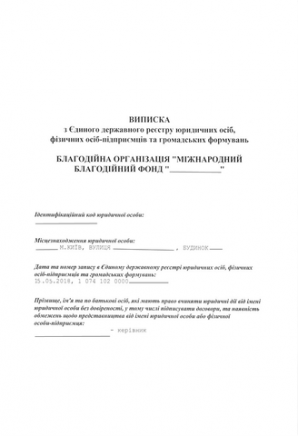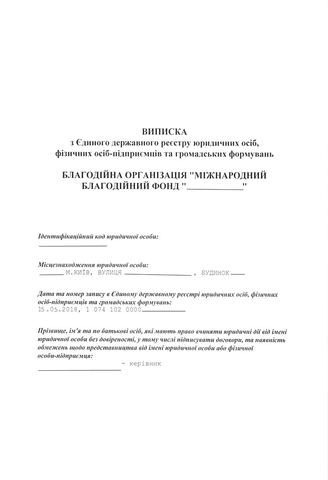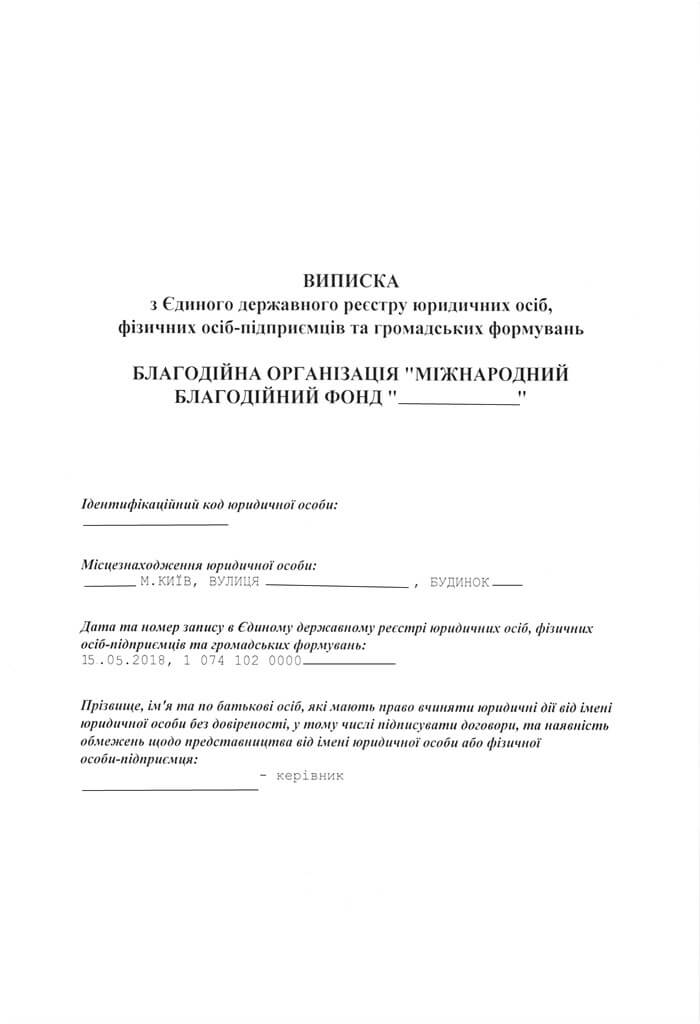Inclusion in the register of humanitarian aid recipients
Cost of services:
Reviews of our Clients
Given the pressing need for humanitarian assistance in Ukraine today, it is essential for charitable organizations and foundations to efficiently import, store, and distribute aid. In this situation, registration in the Registry of Humanitarian Aid Recipients is a crucial step for legally carrying out charitable activities.
Registration in the Registry enables humanitarian organizations and foundations to legally receive aid according to international and national regulations and laws. This registration ensures they can keep their financial and accounting records in compliance with legislative requirements. Moreover, this status establishes a solid basis for trust, leading to increased opportunities for securing funding and support from international and national entities.
However, for many initiative groups involved in delivering or planning to deliver humanitarian aid to Ukraine, the process of being included in the Registry can be quite complex. Moreover, misunderstandings regarding the established requirements and procedures have already led to legal issues and customs rejections when importing goods, thereby obstructing the delivery of much-needed assistance.
- How can one verify that data is correctly entered into the registry?
- What happens if there's a border refusal while the humanitarian aid is already en route?
- What are the necessary steps and required information for registry entry?
- Which documents are essential for gathering the necessary paperwork?
Hence, our company has firsthand experience in comprehending the complexities that charitable organizations may encounter when attempting to register in the Registry. We have already received numerous inquiries from volunteer initiatives and charitable foundations, many of which have faced challenges not only with registration but also with transporting humanitarian aid across borders. As a result, we offer comprehensive information about all the requirements and procedures in our article to support these organizations.
Additionally, for those seeking not just information but also dependable support, we offer consultation services for successfully obtaining inclusion in the Registry of Humanitarian Aid Recipients. With us, you'll not only gain a comprehensive understanding of all registration aspects but also receive assistance in preparing necessary documents, if required, to ensure your charitable endeavors are both legal and effective.
You may also like: How to Prepare a Charitable Foundation for Receiving Foreign Aid?
Automated Humanitarian Aid Registration System: Steps for Importing Aid
Working with the Automated Humanitarian Aid Registration System greatly simplifies the processes of importing and distributing humanitarian aid. This system ensures transparency and efficiency in the operations of charitable organizations. However, to take advantage of this system, it is crucial to correctly navigate the registration process while meeting all requirements. Here are some key steps:
- Registration: Begin by registering on the Automated Humanitarian Aid Registration System platform to receive an official registry number.
- System Login: Access your personal electronic cabinet in the system using your Qualified Electronic Signature (QES).
- Cargo Registration: Once logged in, add a new humanitarian aid entry. This includes filling out details about the donor and the cargo, such as the sender’s name, type of cargo, quantity, units of measure, weight, and other required information.
- Obtaining a Unique Cargo Code: After entering all necessary cargo details, you will receive a unique code for the humanitarian aid. At this stage, a preliminary draft declaration is also generated.
- Declaration Formation: With the unique code, you can now formulate a Declaration detailing the list of items classified as humanitarian aid.
- Inventory Description: Complete an inventory description for the institutions or organizations funded by budgets or local governments.
- Filing the Report: By the 15th of the following month, submit a Report on the Availability and Distribution of Humanitarian Aid.
Our legal team highlights the necessity of carefully observing the following critical aspects when working with the Automated System for Humanitarian Aid Registration:
- A declaration can only be created after the humanitarian aid has been assigned a unique code.
- The description of the cargo must correspond precisely to the documents that will be used for customs clearance.
- Both the inventory description and the report on the availability and distribution of humanitarian aid require the signature of the organization’s head, using a Qualified Electronic Signature (QES).
To avoid potential errors and ensure efficient operations with humanitarian aid, we strongly advise meticulous attention to detail when completing documentation to ensure that all information about the aid accurately reflects its actual status.
Our legal team is prepared to offer qualified consultation and professional support at any stage of your engagement with the Automated System. Our specialists are dedicated to ensuring that documents are filled out correctly and precisely. We aim to provide not only legal compliance but also maximum ease and confidence throughout the entire process.
You may also like: How to Open a Bank Account for a Charitable Foundation in Ukraine?
Success Story: How Our Company Assisted in Importing Humanitarian Aid
A client from the Federal Republic of Germany approached us with the need to register an International Charitable Foundation. After successfully completing the registration, it was time to import humanitarian aid. For foreign founders, this task presented complex challenges that could lead to several negative consequences:
- Denial of cargo import;
- Customs difficulties;
- Errors in financial accounting;
- Issues with the tax service;
- Unnecessary expenditures and other problems.
The clients assessed all the risks, chose to minimize them, and save time by seeking our professional assistance.
Our company, specializing in legal support for nonprofit organizations, helped the clients navigate all the stages of inclusion in the Humanitarian Aid Recipients Registry. We provided comprehensive consultations and took responsibility for assembling the first shipment—medicinal and medical supplies—and obtaining a unique code. Thanks to our support, the client was able to fully understand the Automated Humanitarian Aid Registration System from A to Z, quickly carry out their humanitarian activities, and avoid customs issues.
If you need help, reach out to us. Collaborating with our company ensures expert execution that will help you smoothly navigate the registration process. Understanding that each situation is unique, we offer a personalized approach to each client. We will ensure your organization successfully completes all procedures and requirements, allowing you to focus on what matters most—providing aid to those in greater need!
You can reach us on our toll-free multi-channel line at 0 800 201 958, or use the "Request a Call" button to schedule a consultation. We are always here to provide the essential support and help you need for your charitable endeavors.





